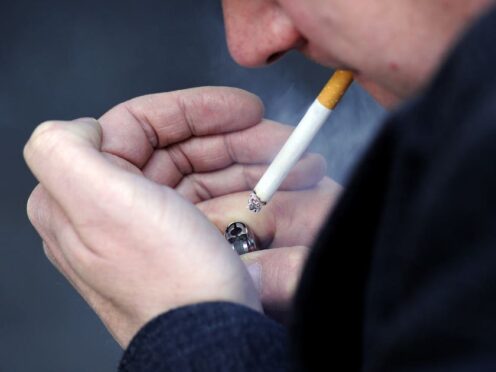A rising number of smokers have attempted to kick the habit due to the cost of cigarettes, figures suggest.
Communicating the potential savings people can make by cutting out cigarettes could help even more people quit, academics said.
It is expected that the cost of a pack of cigarettes will top £16 from October 2026, after Chancellor Jeremy Hunt hiked tobacco duty in his spring Budget this year.
Quitting smoking is one of the best things you can do for your health. It reduces your risk of smoking-related diseases like cancer and stroke.
Here are some tips to help you quit for good.
➡️ https://t.co/NcaBFIX8p4 #SmokefreeGeneration
— NHS (@NHSuk) April 16, 2024
Researchers, led by academics from University College London, wanted to assess whether the coronavirus pandemic and the cost-of-living crisis had an impact on smokers’ desires to quit.
Some 5,777 adults in England who classed themselves as smokers in the past year were involved in the study.
Each had made one or more serious attempt to quit in the last year.
Some were surveyed each month between 2018 and 2023 to capture changes in time.
Up to 2020, one in two attempts to quit were motivated by health concerns (51%); 20% were due to “social factors”; one in five (20%) were motivated by cost and one in six (16.5%) quit attempts were made after advice from health professionals.
In 2020, when the pandemic hit, the proportion of attempts to quit motivated by health concerns, social factors and cost increased to 56.2%, 23.9% and 25.8%, respectively.
But those motivated by health professional advice fell to 8%.
Rises in motivation linked to health-related or social motives soon returned to normal levels, but attempts to quit motivated by cost increased further during 2022–2023.
Quit attempts due to cost stood at 25.4% in May 2023 compared to 19.1% in March 2019, the authors said.
And those motivated to quit after advice from a health professional “remained suppressed” at just 8.5%.
“Health concerns remain the most common motive for trying to stop smoking. The relative importance of other motives has shifted since 2020, with cost motivating a greater proportion of attempts to quit and social factors and health professional advice motivating a smaller proportion,” the authors wrote in the journal BMJ Public Health.
“As cost is an increasingly important motive for trying to stop smoking, communicating the potential savings people can make by stopping smoking could be effective for motivating attempts to quit.”
It comes after a separate study, published last week in the journal BMC Medicine, found there has been a rise in the proportion of middle and upper-class women under the age of 45 smoking.
The researchers said the cost-of-living crisis may have affected more disadvantaged women’s finances and, therefore, their desire to smoke.
Government figures suggest smoking costs the UK around £17 billion a year, including £10 billion every year through lost productivity.
It says this cost dwarfs the around £10 billion raised through taxes on tobacco.
